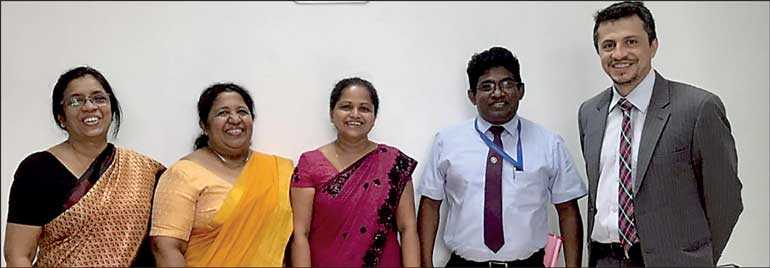Monday Feb 16, 2026
Monday Feb 16, 2026
Tuesday, 18 February 2020 00:00 - - {{hitsCtrl.values.hits}}

Within the framework of the EU-Sri Lanka Trade Related Assistance Project, funded by the European Union (EU) and co-implemented by the United Nations Industrial Development Organisation (UNIDO) and the International Trade Centre (ITC), UNIDO is facilitating the achievement of international recognition for select Conformity Assessment Bodies (CAB) to increase the supply and array of quality infrastructure services offered to enterprises in the food and spices sectors in Sri Lanka.
One of 26 beneficiary CABs with whom UNIDO is working closely with, the food laboratory operates under the Industrial Development Board (IDB). The opening ceremony of the Industrial Development Board’s food laboratory took place on 13 February in Moratuwa. Minister Wimal Weerawansa and Secretary J.A. Ranjith of the Ministry of Small and Medium Business and Enterprise Development, Industries and Supply Chain Management and IDB Chairperson Upasena Dissanayake were honoured guests who delivered opening remarks on the milestone achieved.
UNIDO Quality Infrastructure Specialist Jairo Villamil also remarked on the socioeconomic cost-benefits of food safety reform and the failure to do so. “Approximately 22% of Sri Lanka’s population, that’s roughly four million people, become ill on an annual basis due to food-borne diseases. Sri Lanka has great export potential, but the primary bottleneck is compliance with international requirements. SMEs can get a better price when the risk of non-compliance is demonstrably reduced. Just boosting the price by 1% would translate to more than a billion dollars in revenue per year, along with a host of other socio-economic benefits. Through this lab, IDB will be contributing to the overall food control system, improved health and mortality, and greater economic productivity and trade capacity. This could be the best public lab islandwide with state-of-the-art facilities, excellent equipment and competent staff. UNIDO had the honour of supporting this lab to work towards international recognition. We expect immense benefits for the export community from this achievement,” he added.
Through technical consultancies and training, UNIDO is capacitating IDB to bridge technical and quality-related non-compliances against ISO/IEC 17025:2017, the general requirements for the competence of testing and calibration laboratories. Thus far, UNIDO conducted an assessment of its quality assurance system, against which non-compliances were identified and corresponding corrective actions put forth. Training covered practical and theoretical aspects of testing methods and all aspects of accreditation requirements, including manual writing, calculation of measurement uncertainty and internal auditing. UNIDO also financially supported equipment calibration, procurement of reference material standards and participation in proficiency testing.
As a passport for international trade, conformity assessment provides an enterprise with a competitive edge in the market. By facilitating the achievement of international recognition for microbiological and chemical testing services at IDB’s food laboratory, an enterprise in the sector can assess its products in accordance with relevant standards, adapt to the latest market trends regarding quality, and mitigate costs related to product returns, buyer complaints, and loss of goodwill in local, regional and international markets. Beyond technical support to the laboratory, UNIDO is working with more than 40 SMEs nominated by IDB to strengthen their export compliance capacity. In partnership with IDB, food testing services will be provided to these beneficiary SMEs to facilitate product export readiness.